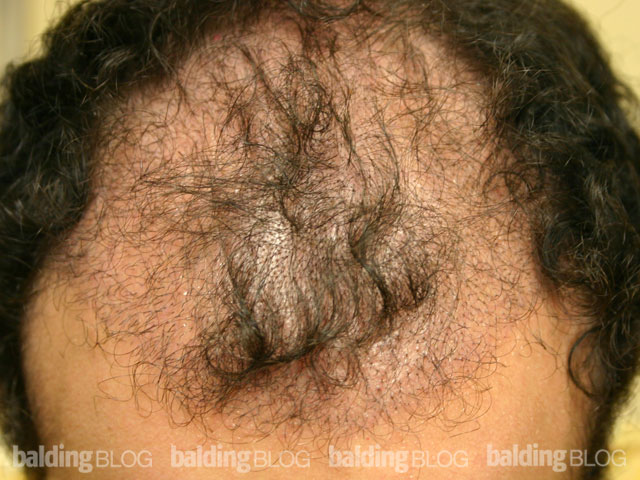I am a 53 year old male who was blessed, until November 2004, with a mostly full, but fine head of hair. At Halloween, I put hair coloring in my hair for a costume, did not wash it out until the following Monday morning (the color came out when I slept and I did think about the chemicals still being there – when I read the can later, it said not to use on fine hair – I was extremely mad at myself). Anyway, I had six weeks of an itchy scalp and some hair loss with it.
This past summer, I had another 8 week bout with itchiness and even more hair loss- I started using tea tree oil shampoo and creme rinse, and Jason’s thin-to-thick shampoo and rinse, as well as putting jojoba oil with tea tree oil into my scalp at night. I visited two Chicago area doctors who told me itchiness was part of the active balding time and nothing was wrong with my scalp. I visited them after this bout ended, with loss that I now wanted to do something about. I decided to go to female doctor at the end of October 2005. Everything went fine until a couple of months ago, four months after the transplants. I started to notice hair coming in, but then the itchiness/sensitivity started. I thought that was just irritation from the new hairs, but then I started to worry that maybe this was not the case. Anyway, the hairs placed deeper in the middle front and the majority of the right side transplants came in, but the front middle (new V) and the front left side mostly did not. I am very unhappy about this, and I just hate this feeling of itchiness /sensitivity that is only on the left side this time. (two months and running-getting better) I was / am taking propecia three times a week, as I had a lowered libido with daily use. (Dr. told me to go to 3x a week) I was not using Rogaine until a week ago, where I started to use Scalpmed, another minoxidal product.
Do I possibly have some stress loss of new hairs? Should I go back to using Propecia more often? I can accept the more frequent use until the hairs come in, if they still can. I was told by an assistant than it will take 18 months for the complete result.
I am in great need of some guidance. Thank you
If you have a good doctor, you should be discussing these things with that doctor. You asked about itchiness and was told that it is caused by male pattern balding. That is not the case as there is no evidence that the two are connected directly unless it is the result of sunburns or other things that dry your scalp skin. You had transplants about 7 months ago. I generally tell patients that 80% of the results will be in by the 8th month and 95% should be in within a year. If one side grows slower than the other, that is ok, but if one side does not grow and the other side grows out well, then the technical people placing (different technicians placing the grafts into the different sides of the transplanted area) may have caused a problem that killed off hair. Less skilled technicians may damage the grafts when moving them around or take longer to place them and in the process of placing the grafts, they just dry them out (just 10-15 seconds exposure of these grafts to the air can kill them). Wait out the full 8 months first before thinking of the worst.
Taking Propecia three times a week makes no sense to me, because it is completely out of your body in a day. Taking 1/2 tablet of Propecia each day has about 80% of the benefits of taking a full tablet if you have a libido problem. Rogaine (which is minoxidil, also contained in ScalpMed) can dry the skin and make it itch and that is not commenting on the other additives in each of the commercial products containing minoxidil. Propecia will have no effect on the new hairs, nor will the minoxidil impact the hairs from the donor area. I think that you need to sit down with your doctor and get answers from your doctor, real answers and not be talking to his technicians. This is what a doctor/patient relationship is about.




 It sounds like you experienced shock loss and if this is in the miniaturized hair, the hair may not come back. Treating thinning with transplants is not something I do often. In many people with miniaturized hair, transplanting into that ‘unhealthy’ hair does little to really increase the fullness. I believe that for most people like you, any benefit you will get in the long term may be lost in the short term, making transplants a poor decision. I would think that Propecia should have been used in advance of your hair transplant procedure just to minimize this risk. The transplants done may offset the hair loss and the Propecia may bring some of the hair back. Only time will tell. Once the glass of milk falls and the milk spills out, it may be impossible to bring it back.
It sounds like you experienced shock loss and if this is in the miniaturized hair, the hair may not come back. Treating thinning with transplants is not something I do often. In many people with miniaturized hair, transplanting into that ‘unhealthy’ hair does little to really increase the fullness. I believe that for most people like you, any benefit you will get in the long term may be lost in the short term, making transplants a poor decision. I would think that Propecia should have been used in advance of your hair transplant procedure just to minimize this risk. The transplants done may offset the hair loss and the Propecia may bring some of the hair back. Only time will tell. Once the glass of milk falls and the milk spills out, it may be impossible to bring it back.